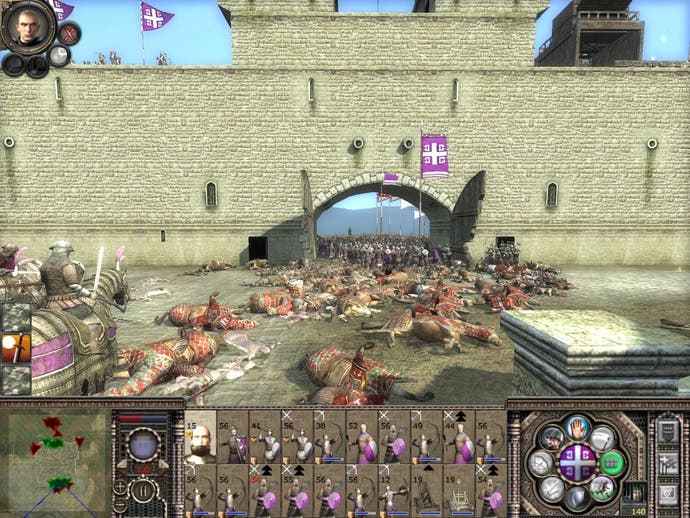Medieval II: Total War - Kingdoms
Conquistadors: The old astronauts.
Criticisms are minimal.
I kind of wanted to leave it like that, but that's being lazy, even for me. I've wasted happy days playing this, when the article's only abstractly a first look, so I'm in a bit of a rush to get this written because, firstly, I should be really doing something else and secondly I want to get back to finish off the Turks and start my plans for the invasion of Egypt.
This is both an add-on pack that plays to the Total War traditions and something that stands separate from them. It's similar in that the campaign it offers - like Rome's Alexander and Medieval 1's Viking Invasion - is a smaller thing than the grand campaign in the mother game. While most expansion packs are only for the hardcore, Total War ones have often been more accessible due to the reduced scale and increased focus. Or, put simply, it's easier to conquer England than Europe. This is entirely a compliment - there's still multiple factions inside each campaign to allow replaying. Where it divorces from the other packs is that it's not one new campaign. It's four.
It's an enormous amount of content. To my eyes, it's the largest Total War expansion pack by far.

The four campaigns are: Britannia, The Teutonic, the Crusades and the Americas. Britannia is set in the thirteenth century, involving the large and powerful English trying to stay large and powerful in the face of the Irish, Scottish, Welsh and the Vikings. The Crusades covers the period leading up to the third campaign, where the Kingdom of Jerusalem is... oh, it's the one you know. Saladin, Richard the Lionheart, the Hashashin, all that lot. The Teutonic Campaign is set in the thirteenth century, revolving around the attempts to bring the one remaining genuine Pagan nation - Lithuania - in line with the immutable beauty of the one Holy Church of Rome. The Lithuanians, understandably, just aren't having it. Teutonic Knight Rumble! Finally, the Americas centres on the initial war between the Spanish Conquistadors and the dominant Aztecs (with the Mayans deciding to have a crack at being a main player at the same time). In other words, a lot of variety. It's easy to initially start a campaign you're not interested in only for something to make you realise you actually are. For example, I was shrugging at the prospect of a war against Aztecs until thousands of axe-wielding everyone-sacrificing bastards came out of the undergrowth. And then I was very interested and trying to avoid dying messily.
As well as playing on its own map - and so offering differing strategic challenges solely through the altered terrain - there's a number of scripted events to enliven and endanger a situation. For example, the initially dominant English position in the map being undermined by a Baron's Alliance rising to challenge you, gathering units with low loyalty to its flag. There's also a number of mechanistic twists in a few of the sides. For example, in the Teutonic campaign, the actual Teuton knights lack the ability to transform castles into cities due to their not being a real, recognised nation. Equally, their cities don't grow to the full size. Similarly, their prime enemies the Lithuanians' maximum settlement size is limited until they volunteer to convert to Catholicism - at which point, they lose access to the highly effective and fanatical pure-pagan units. In other words, while submitting may be inevitable, the choice of when to switch is paramount. And, as that "fanatical pure-pagan units" implies, every side in the game has their own unique units to purchase.

For example, playing the Byzantine Empire in the Crusades you're helped in your difficult position of being the non-Islamic non-Catholic side of the battlefield by having access to the frankly-grotesquely vicious Greek-Firethrowers as long as they hold Constantinople. Clearly deeply vulnerable, and requiring careful management, their jet of mysterious fire is just as likely to annihilate friendlies as opponents. They're capable of turning a battle. Well...against certain troop types, anyway. Historical purists will be pleased to know that there's a minimum of these kind-of-fantasy units in the game (The Greek Fire is the only thing that'll raise eyebrows in the Crusades campaign, for example). The same historical purists will also be pleased with how the campaigns - while clearly leaving room for player carving their own destiny - also include lots of colourful nudges to make the period come alive. When playing Byzantine, the crusading Venetians arrived determined to sack Constantinople on the way to (well) spending whatever they find in Constantinople.



